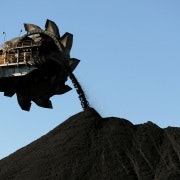Is the Future Fund falling behind the divestment curve?
When questioned in Parliament on Thursday about why the Future Fund has not divested from fossil fuels, Chairman Peter Costello was quick to respond that the fund's only mandate is to deliver investment returns.
Costello's response is typical of a generation of money managers who don't yet appreciate the enormous risk that climate change poses to financial markets. So far, it has fallen largely upon the shoulders of environmentalists to draw investors' attention to this risk, however the issue is now rapidly spreading to the senior levels of global money managers like Goldman Sachs and the world's largest fund manager, BlackRock.
While Costello defends the Future Fund's fossil fuel investments and Prime Minister Tony Abbott stands up for coal at the G20, the rest of the world is waking up to the reality that climate change is as much a financial risk as it is an environmental or social one. This shift explains why China and the US last week signed the world's most ambitious climate deal, why the Norwegians are considering divesting their sovereign wealth fund, and why the head of the Royal Bank of England recently agreed that most fossil fuels must stay in the ground.
Yet back home in Australia, the Queensland Government is selling public assets to invest in mega coal mines, ANU's divestment from two fossil fuel companies recently prompted weeks of outrage from federal Cabinet and the financial press and our coal lobby is on a crusade to convince investors that fossil fuel divestment is financially imprudent, even illegal.
But what Campbell Newman, Tony Abbott, Peter Costello and the Minerals Council ignore (or rather deny) is that, to the extent that climate change carries a financial impact (as experts agree it does), investors are compelled to respond and divestment is a legitimate response.
A recent report by the UK Law Commission found that superannuation trustees not only can take environmental, social and governance issues into account when making investment decisions, they must account for them where those issues have a proven material financial impact and where they have good reason to think that their members share their concerns.
While environmental campaigners call for divestment on moral grounds, financial experts increasingly agree that fossil fuels carry growing risks. A 2012 report by Baker and McKenzie concluded that trustees have a clear duty to consider climate change risks when making investment decisions.
Indeed, were climate change without financial risk, coal would not now be entering a permanent structural decline nor would the number of fossil-fuel free investment portfolios have grown by 50 per cent in the past year, nor would major institutional investors – such as Stanford University and Norway's largest pension fund, KLP – be shedding their fossil fuels investments.
And as the Minerals Council ploughs thousands of dollars into reports arguing that divestment and ethical investment will hurt mum and dad investors, a growing body of literature proves the contrary. Asset consulting company Russell surveyed over 40 empirical studies on the impact of ethical, sustainable or socially responsible screens on investment performance, concluding that “there is no necessary performance penalty” from pursuing such an approach. Meanwhile, global index provider MSCI now offers a fossil fuel free index that is outperforming the benchmark and global fund manager Aperio Group finds that the impact of excluding fossil fuel stocks from US and Australian portfolios is negligible, in some cases yielding better returns.
In short, divestment need not compromise returns and may actually protect investments against growing carbon risks. Which is exactly why the Financial Services Council recently stated on ABC national radio that: “the debate on divestment and ESG broadly is a debate which the investment industry should lead because the principles here are fundamentally economic.”
As for the UK Law Commission's finding that investors can and should act where they have reason to think their members share their concerns, one wonders whether Costello is out of touch with his fund's members – the current and future public servants of Australia. Poll after poll finds that the majority of Australians are concerned about climate change and a recent survey found that 67 per cent of Australians would move their money out of financial institutions if they found them to be invested in coal and gas.
The Future Fund divested from tobacco on ethical grounds because, in Costello's own words "there is no safe level of tobacco consumption". Costello owes the Future Fund's beneficiaries an explanation of what a “safe level” of climate change looks like and how investing their money in a sector that the world's biggest money managers are beginning to exit is in keeping with his fund's core mandate to deliver investment returns.
Blair Palese is Australian chief executive of 350.org.
















